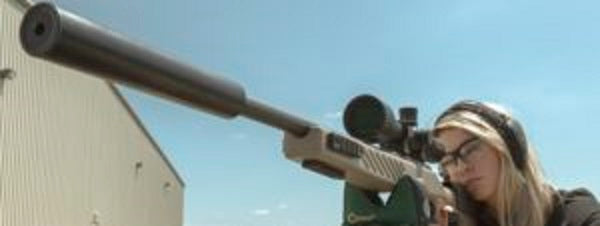Silencers, commonly referred to as suppressors, have become all the rage in the firearms industry.

Before any of y’all try to correct me—let me start off by clarifying, silencers don’t actually silence a gun, they simply suppress the sound. While they are gaining popularity, they are still one of the most heavily regulated products in the gun industry. Many hunters, firearm enthusiasts and lawmakers are pushing legislation to loosen the strict regulations—saying quieter guns protect shooters’ hearing. One of the most well-known companies, SilencerCo, argues that their products are unfairly regulated and vilified. On the other end of the spectrum, opponents fight a change in legislation by citing recent mass shooting as examples of why guns should remain loud and recognizable. Without getting lost in controversial weeds, let’s talk about how silencers work and just how to get one.
Suppressor Definition
A suppressor is a device that you attach to the end of your barrel to suppress noise.
Suppressor Design

The trigger is pulled, dropping the hammer onto the primer. The resulting spark ignites a charge that propels the bullet through the barrel. The pressure of hot gas behind the bullet causes the bullet to accelerate through the barrel. When the bullet exits the barrel, it enters a silencer. The silencer has a greater volume of space than the barrel. This allows hot gas to expand, relieving pressure. As a result, when the bullet finally exits it is much quieter.
Suppressor Laws
First off, where you currently live determines if you can legally own a silencer; 42 states allow possession without a permit. The eight states with restrictions on ownership are: California, Illinois, Delaware, New Jersey, New York, Massachusetts, Rhode Island and Hawaii. If you live in one of the 42 states currently allowing private ownership, you must also: Be a US resident, be legally eligible to purchase a firearm, pass a BATFE background check and be at least 21 years old or at least 18 years old to purchase from another citizen.
When figuring out which silencer you want, you need to research a bit. It’s not just “pick a can and attach it to a gun” – there’s a little bit more to it than that. It is crucial you ensure your silencer of choice is compatible with the caliber you own and is capable of being attached to your firearm.
Next, you must find a licensed dealer. As silencers are becoming more common, more stores are stocking them; however, in some areas, they are still tough to find. Once you pick your silencer, your dealer will set it aside and provide you with two ATF Form 4s. The dealer will fill out the product information. Depending on if you are acquiring your silencer as an individual or through a trust determines the next step. As an individual, you fill out the Form 4s, as well as the ATF Form 5330.20 Certificate of Compliance. In order to complete this, you’ll need certification from your local chief of law enforcement officer (CLEO). You also need two copies of fingerprint cards that you will mail in with your Form 4’s. If acquiring the silencer through a trust, include the name and address of your trust on the Form 4s.
After compiling all the forms and mailing it to the ATF—you wait. Generally, it takes at least three to four months to hear back from the ATF on a Form 4 approval. Once your dealer receives the paperwork affixed with your tax stamp they will promptly notify you and you will be able to pick up your brand-new silencer.
Click here to read more on how to purchase a silencer.
Do you own a suppressor? How long did it take for you to get your tax stamp? Tell us in the comment section.
About the Author
Hey Y’all! My name is Camille and I was born and raised in Wisconsin. I’m currently a senior psychology major at TCU. After graduation, I plan to pursue a career in the outdoors industry. I grew up hunting, shooting, and fishing whenever I could with my dad and grandpa. Any time I’m not working or studying you can find me in the woods hunting or on a boat fishing.


Thank you for informing us that suppressors, otherwise known as silencers, are used to suppress noise from our rifle once attached to the end of the barrel. My dad got into hunting recently and invested in a rifle to use on his next duck hunting trip with his friends, so I was thinking of buying a suppressor for his firearms. I’ll keep this in mind while I start looking for Omega 9k suppressors for sale before their hunting trip. https://www.freedom-weapons.com/product/65611/SCOOMEGA9KFDESU2643